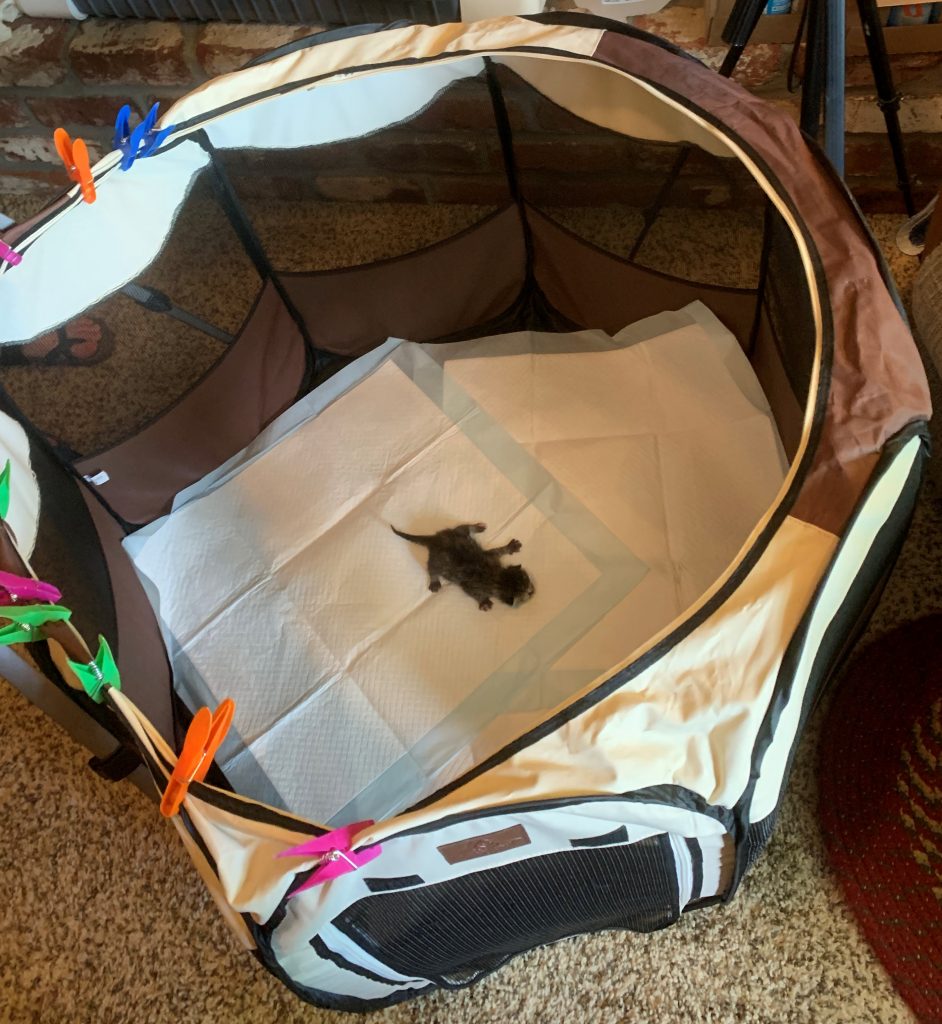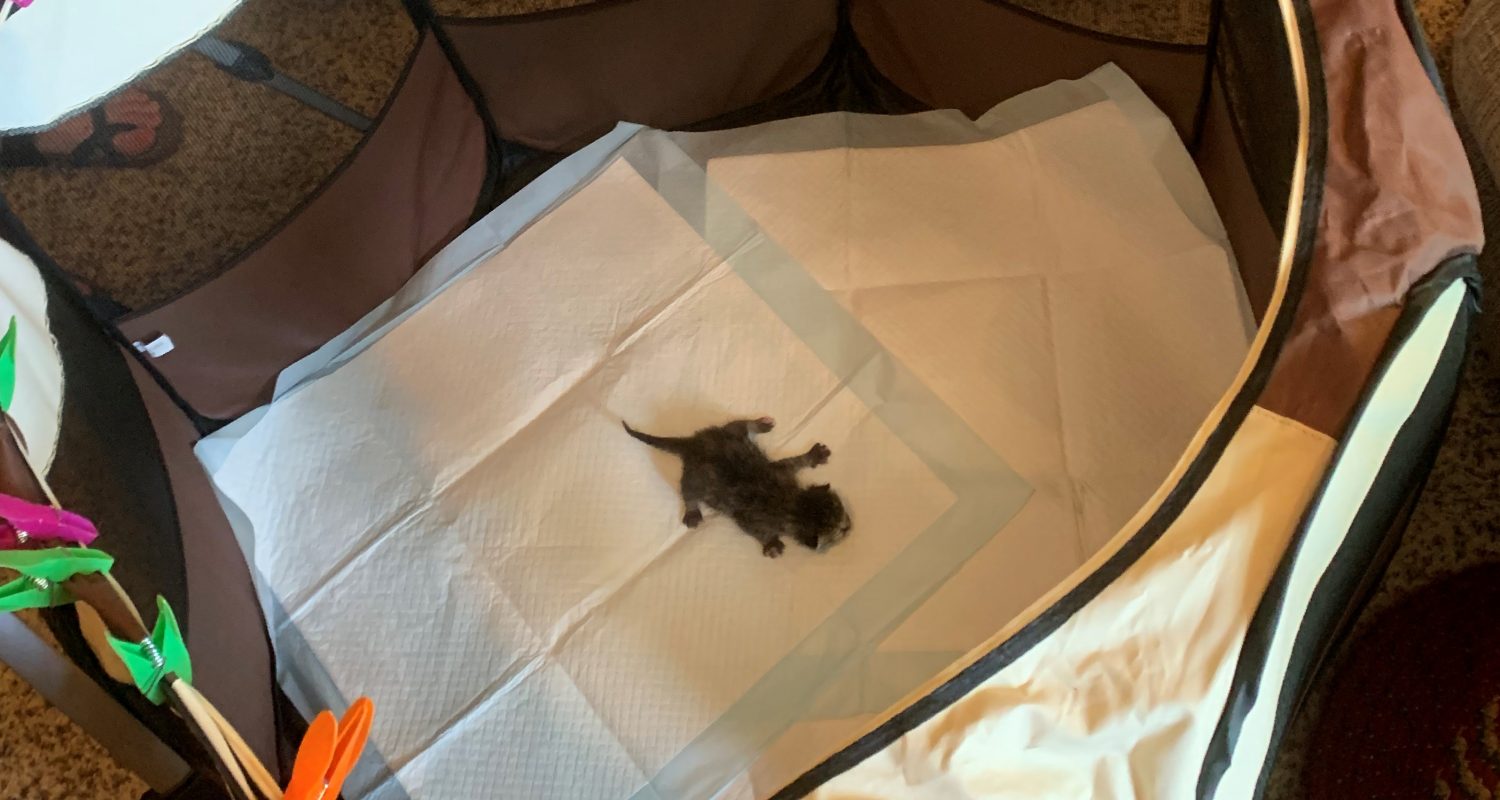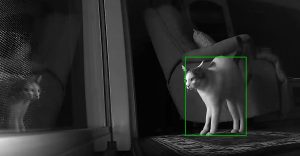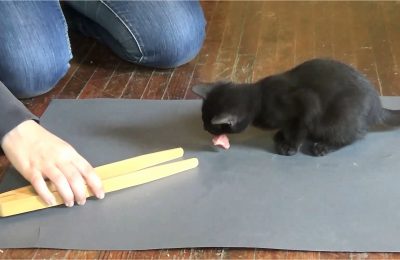Our new study says yes.
For the past few years, I’ve been working at the UC Davis School of Veterinary Medicine, where I’m a postdoctoral researcher. One area of focus for my research has been the health and behavior of orphaned neonatal kittens (neonatal refers to kittens less than three weeks of age). This is a fragile population that has gotten more attention recently due to the dedication and amazing work of people like Hannah Shaw and Ellen Carozza, LVT. Kittens often become orphaned due to good Samaritans who find kittens outdoors without mom. Mom may be off hunting, but sometimes it is hard to know, and these kittens may find their way into animal shelters or rescue groups, where they need very specialized care.
Because more shelters and rescues are increasing their capacity to care for neonatal kittens, we need to better understand how to care for them, and how that premature separation from mom might impact kitten health and behavior. When neonates, kittens naturally spend most of their time in direct contact with their mother. Adverse early life experiences (including neglect and other stressors) can also affect later outcomes in humans and other species.
Because there are so many orphaned kittens being cared for by rescue groups, this is an excellent opportunity to research the impact of early maternal separation, without having to deliberately separate any kittens from their mothers. All my research with kittens occurs in foster homes, with kittens who were surrendered to local animal shelters and rescues.
They cry and they move a lot!
A few years ago, researchers at UNAM found that kittens were relatively consistent in their activity and vocalizations when kittens were briefly separated from their “nest.” (In this case, we will consider the nest to be the space where kittens spend time with mom and/or littermates, often a carrier, crate, basket or box.) Kittens were tested multiple times between one and three weeks of age, and kittens who cried more and were more active at one week of age, also tended to be more active and vocal at other testing periods.
Why would researchers be interested in vocalization and activity? When separated from mom/home, young animals often let out distress cries – that’s a way to alert mom – “HEY I NEED HELP!!”. Being more active when you are lost may also help you find your way back home.
Because the previous study of kittens only looked at kittens who were with their mothers, we decided to replicate the study – with a twist – comparing orphaned kittens to mother-reared kittens. The results, “The effect of premature maternal separation on distress vocalizations and activity in kittens (Felis catus) during a brief nest separation,” were recently published in the journal Applied Animal Behaviour Science.

What did we do?
We tested 49 kittens, testing as many of them at 1 and 3 weeks of age as possible. We separated kittens from their litter mates and/or mothers for two minutes, placing them in a pop-up pen in a separate room and recording what they did for two minutes. Later, we coded the captured videos to measure the number of vocalizations and the number of seconds they spent moving around the pen. We controlled for odor between kittens by changing out puppy pads placed at the bottom of the pen and by sanitizing the pen between litters. You can see examples of what happened in the video!
Our results found that, overall, orphaned kittens were more vocal and more active at both time points. This finding suggests that orphaned kittens may be more distressed and more motivated to return to their nest when isolated. To sum – premature maternal separation may increase stress responses in kittens, and the effects of this stress appear to continue at least until a few weeks after the separation. We hope in the future to continue to explore whether this increased stress response continues as kittens age and become adults.
I should also note that the purpose of this research is not to “prove” that there’s anything wrong with orphaned kittens who are hand-raised. There may even be benefits to being a human-reared orphaned kittens that we haven’t contemplated (for example, it allows kittens to eat as much formula as they want, without competition from litter mates). We can hopefully learn from this research how to better help orphaned kittens cope with stress. But in general, neonatal animals should stay with their mothers whenever possible. Hannah Shaw, aka, the Kitten Lady, has a great guide to whether kittens should be rescued from the streets or if they are fine where they are.
One of the highlights of being a scientist is mentoring students and seeing a research project develop from the formation of an idea to a publication. This study was a summer research project for Kira Lowell, an all around awesome veterinary student at UC Davis who was part of the Students Training in Advanced Research (STAR) Program; Sabrina Mederos, who I mentored as a McNair Scholar and is now a graduate student in Animal Behavior at UC Davis, was also critical to the completion of this project!
If you’d like to read the paper, this link should lead you to a version you can download for free until November 20th, 2020 (after that it will be behind a paywall). If you have any problems with accessing the paper, don’t hesitate to reach out to me, and I’m happy to send you a PDF of the manuscript!
References
Hudson, R., Chacha, J., Bánszegi, O., Szenczi, P., & Rödel, H. G. (2017). Highly stable individual differences in the emission of separation calls during early development in the domestic cat. Developmental Psychobiology, 59(3), 367-374.
Lowell, K. J., Delgado, M. M., Mederos, S. L., & Bain, M. J. (2020). The effect of premature maternal separation on distress vocalizations and activity in kittens (Felis catus) during a brief nest separation. Applied Animal Behaviour Science, 105130.




I took in an o.c. (Orphaned Cat) 7 years ago. At the time, the vet placed the age at 4 to 5.5 months.
When I found him (he found me), he was drinking milk from a bowl my neighbor placed out on her veranda after.c. followed her and her 2 small dogs home from their walk..
The first time o.c. saw me, he came down immediately. did a figure “8” through my feet and partially on my right foot. I took him back with me, home (40′ ft away). My kids convinced Mom that this was a terrific new addition to our family. I went immediately to Wal-Mart and purchased a litter box and a few other accessories. To this day, Prinzy has not had any accidents, except when he was inadvertently locked into a storage room in the basement for a few hours, in fact, he did his business in the furthest corner from the door.
However, one persistent problem with o.c. is his scratching on our upholstered furniture that ran a few thousand to repair.. I did notice after a few months that when he scratched the chair and I got up and he went to the door of the front room with access to the mudroom/outside door. Now I have to train the rest of the family that their is a correlation…
Note: A few months after taking o.c. in, this female black cat with identical markings to Prinzy, came walking in the middle of road towards our home and o.c. got up raced towards the end of the driveway and acted in an extremely aggressive manner, he’s never done this before or after.
Perhaps this seems strange, but Prinzy, does not seem to take things for granted (except the furniture) , he’s mindful of his surroundings and displays a kind of respect that a human does… We love this 6th member of our family!